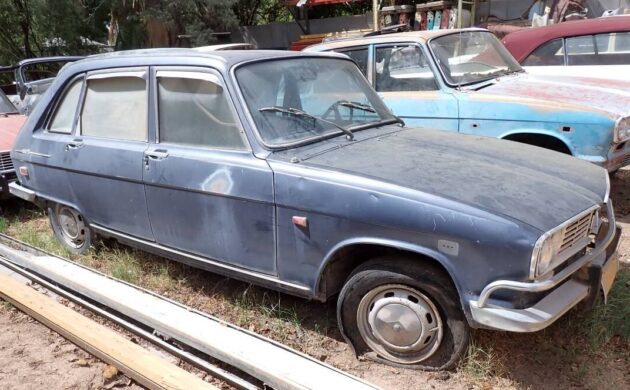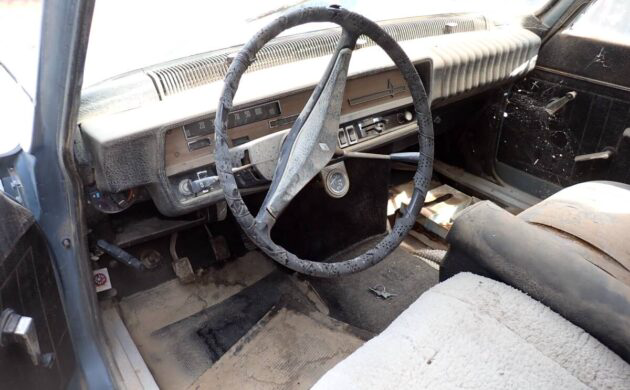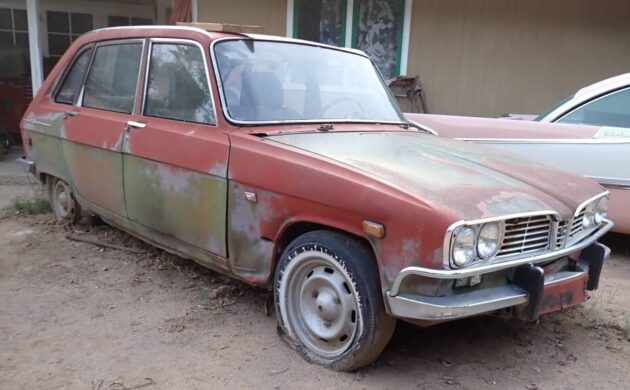Leave it to the French. The country’s designers had a knack for eyeing a thing everyone else had seen a hundred thousand times and doing it differently. So goes the Renault R16. Introduced in 1965 at the Geneva Motor Show, it was a replacement for the Frégate, a large family car, but it was more advanced in several ways than its older sibling. For one thing, the greenhouse was tall, with three windows down each side and a massive hatchback. No rain gutters for the R16 – instead it had stainless-trimmed rails, suggesting an elegance that the rest of the body disclaimed. The interior was luxurious with leather seats and a full-featured instrument panel. Over its production run through 1980, just under 2 million were made though very few were imported to the US. Despite the unlovely lines, collectors have gravitated to the R16 lately. Here on craigslist is a set of Renault R16s for sale, one of them for $1850 and another parts car for $400; no price for the whole package is listed. Head to Phoenix, Arizona to pick up the lot, or choose among them. This tip comes courtesy of numskal – thanks!
The R16 gyrated through three engine configurations, all sharing one brilliant geometry in the engine bay itself: the motor was situated longitudinally behind the transaxle, which drove the front wheels. This placement balanced the car beautifully, while also leaving the cabin floor unobstructed by a transmission tunnel. The downside was apparent when service was required – access was challenging. The engine itself was aluminum, with four cylinders, sometimes equipped with a Gordini head, generally bearing a Weber carburetor. Output ranged from an asthmatic 50 hp to over 80. Its column shift was a bit behind the times, but this transgression was not enough to dissuade buyers. In another particularly Francophile twist, its rear rear torsion bars sat in tandem, so the wheelbase was longer on the driver’s side. This odd arrangement contributed to a very smooth ride.
Photos of one interior are provided – I think this is the 1970, with one of the plainer instrument panels. An auxiliary gauge is mounted under the dash here. Upmarket and later versions had better instruments (the TS, TX). But all the R16s shared a gymnastic rear seat that could be bent in all directions. It could be a bed, or disappear nearly entirely to expand the cargo space. This innovation, along with the rear hatch, resounded through the ages, bringing forth countless hatchback designs both foreign and American, and any number of wagons with malleable seating.
Here’s another of the three for sale. The seller swapped out a carb to start one of these R16s, but I can’t tell which. In any case, he has several of these carcasses; early birds can probably find enough parts to make a whole R16. The cars are said to be rust-free, having spent considerable time in the desert. Bonham’s recently sold this one for £7,500 – it’s possibly the finest R16 on the planet. Anyone brave enough to adopt this flock of Renaults?









Tip of the hat to the author for derailing the seemingly never ending stream of Chevelles and Mustangs. “Renultzs”, my one and only connection to the French. The R16 was an odd car, duh, the front kind of started out cool, like a ’63 Tempest, then 3/4 ways back, just end it there. I couldn’t imagine making one decent again, a real bonus buy for some eclectic soul that may have a nice one, but the only way to buy one was right off the boat, and even then, a brave person, indeed.
I say this everytime, but the reason, I read, for the tall roofs on French cars, was so police officers didn’t have to remove their tall hats, the “kepi”, when used as police cars. Anyone? Couple hundred bucks, tops for the whole magila. Again, the only reason any of these were sold here, is the Asians hadn’t quite kicked in yet, and all these cheap foreign jobs had a shot. Most buyers bought only one, as even cars like Capri and Opel Manta had a better following. Just more conventional, and as shoddy as the dealer set was for those, it was way better than Renault, relying on, I believe, AMC. I think the R16 shattered the myth of goofy rear engined cars, and had many innovations,,,for a French enthusiast, but here,,,meh. It seemed to pave the way for the Alliance, for what that was worth.
My parents bought a new one in the early 70s. Can’t remember what year. I was a preteen. We took a trip from Northern Wisconsin to Arizona and back. It wasn’t bad but as a kid and now as a definitely adult, they always struck me as odd car. I can safely say that what the French have as mainstream cars certainly isn’t anything like us North American people consider mainstream. P.S. always look forward to reading your comments Howard.
My parents also bought one back in ’73. They drove it down to where we lived during our college years (Springfield, Mo.) with the intention of all 4 of us driving on to Arizona, where my brother lived. Sadly, I don’t think we even made it out of Missouri when the transmission seized up, due to my dad having put a pressure drain plug in it and it all the oil leaked out. He had it towed back to Springfield and waited to have a new transmission installed. I loved driving it for the short time that I did. The 4-on-the-tree was sure unique and the ride was smooth. Sure was a bummer! (They had owned 2 R10;s prior to that and later had a R15. Very fun to drive!)
Colin Chapman bought the all-aluminum motors as well as the transmissions from these to fit in the Lotus Europa. He got about an extra 20 hp more out of the motor than the R16.
This only applies to the engine of the TX – these are early models with the 55 h.p. engine. Mechanical spares are no problem ( in France ) and the cars – including the ” donor ” seem to be no problem to get them back on – to the road…column – change is very good and works perfectly – maybe because the gear- box is in front of the engine, hardly any linkages. One of the best French cars – albeit a bit too dear. The engine of the 16 soldiered on in the Renault 20 and Renault R 18 – bullet – proof.
The total value of all of them is a buck 98.
Escargot?
Hopefully some French car aficionado will be thrilled with this collection of European Automotive Oddity.
Being a retired Wrecking Yard Operator, my only question would be- How much do they weigh?
European Car Of The Year, wasn’t it?
Yes, in 1965.
The agents at Cold War Motors will probably scoop these up and stage another Showdown on their website.
I love Cold War Motors! Haven’t watched a video of their’s for some time. Gonna have to go do that.
My Pa in law liked odd little cars for work commuting. One that he probably kept the longest was a R10. Rear engine, water cooled 4 cylinder, 4 speed transmission. Ugly little box, the steering wheel was offset toward the center of the car, the turn signal stalk was on the right side of the column, wiper stalk on the left. Every time I drove it, I turned the wipers on a couple of times trying to use the turn signal!
I remember parts were a bit hard to find, he had to wait a month for a starter to get here. What did he do? Why he did what a Frenchmen would do, he used the jack handle to hand start it like a model t! Crazy thing was, half a quick turn and it was running like a sewing machine! When he retired he sold the little R10. It gave him about 10 years of use.
This lay – out of wiper and indicator was quite commmon ib France – not only on the Renault R 10 and R 8, but on the earlier Renault 4s , too. Normally, you should get used to that pretty fast; I never had problems with that…
My parents bought a new R10 in ’68. The summer of ’70, we took the thing on a trip from Lansing, Mi. to Silver Bell, Arizona, the 3 of us. I did much of the driving. Just got my license about a month before. Those wind gusts between mountain peaks nearly pushed us into the left lane many times. But a good time was had by all, all the way there and back to Michigan. They later replaced that R10 with a ’69 R10 in a beautiful glossy dark green color. THIS one had a radio in it! And if memory serves, the engine was a little larger, had more power than the ’68.
I owned an R16. Bought cheap, dismantled, repainted, reupholstered, rebuilt engine and brakes. Added Konis and fresh tires. Topped it off with a 5-speed transaxle (still with column shift) from an R16 TX. Total cost in 1984 was roughly $2500. Selling it was maybe the dumbest move I ever made.
An incredibly comfortable car with enormous load area with rear seat folded or removed. Decent gas mileage, and would cruise at 80+ all day. I liked the looks, too. And that fifth gear made a world of difference.
Drawback? Parts, of course. What I couldn’t get new from the dealer or the local Import Auto Parts store came from local boneyards. When it left, I sent plenty of badges, taillight lenses and assorted trim with it. When I found one at Pick-Your-Part (there were quite a few back then), I took everything that wasn’t welded on….
If I had a garage and tools available, I’d probably talk to the seller. I still miss mine.
I’d like to see more of those Forward Look Mopars in the background.
1965, the year these came out. So advanced, huge interior, Cadillac ride and great mileage. Car of the future. usual poor cheap Renault build quality let it down. Went out of production as mainstream cars began to resemble it.
Hello. I actually bought one of these, the one featuring the interior image. It’s actually a 1969 year, and is currently undergoing repairs to get it back on the road. The gentleman I bought it from had never driven them, instead had gotten them from another gentleman who collected these. Documents found inside the car show insurance and maintenance up until 1987, around when it was last driven.
The engine runs very smooth, with no smoke, but it has some electrical gremlins. As of this time, I am rebuilding the brake system, as well as replacing a few engine and body components.
I am planning to use this car as a daily driver, due to its fuel economy, comfort, reliability, and its overall oddball-ness and rarity here in the U.S.